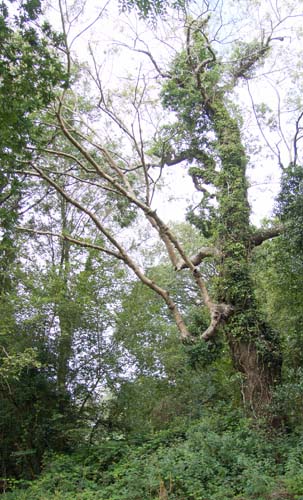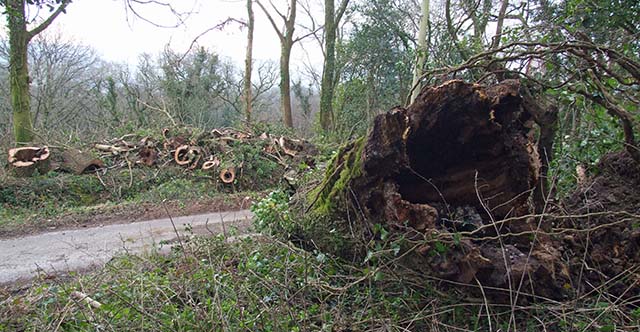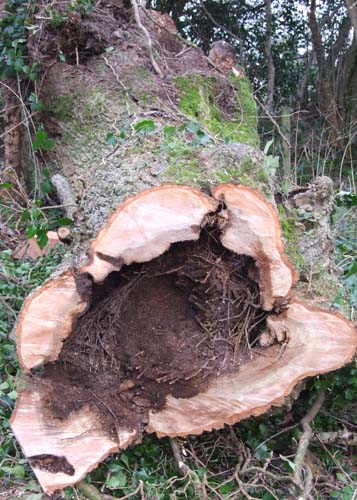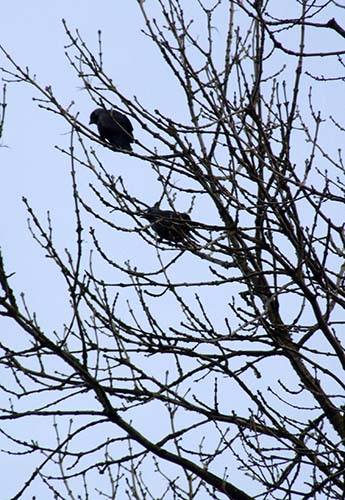Yesterday a (highly) local landmark met its end, succumbing to a relatively moderate windy night as winter merges into spring. I’ve come to know the ancient ash tree – I suppose 150 years old or more – as “the jackdaw tree” since we moved here fifteen years ago.

Here it is last summer. What the photo doesn’t show is the chatter of the colony of jackdaws that have not only nested in its numerous cavities, but have roosted there throughout the year. The tree was a hollow shell when I first knew it, and must have been that way for many decades. And therefore it seems likely that the jackdaws had adopted it as their family seat many generations ago.
But the fact is that whenever I walk along the lane with Charlie the labrador, the chak-chak of the jackdaws reminds me that I’m approaching a monument of antiquity that once overlooked the humble cottages of Cuckold’s Pit before they were abandoned a century ago for lack of mains water, gas or electricity, and fell into ruin. The lane was still an unmetalled track when it was a seedling.
Despite the recent sad encroachment of Ash Dieback in our local woodland (including, I’m sorry to say, some of the mature ash trees on our own patch), I suspect that the scrawny appearance of the Jackdaw Tree was simply the result of venerable longevity rather than disease. I always wondered if it would outlive me, and rather hoped it would… although I took the photograph partly because I suspected it would not.
And indeed, the night before last, one of the last storms of winter took it out. When I took the dog that way yesterday afternoon, it was completely blocking the lane, and had taken out the telephone lines for a hundred feet either way – no doubt to the inconvenience of the scattering of folk living beyond.
A bit later the local highways people drove past my house, and when I went back with a camera this morning, they had chain-sawed the carcass out of the way, leaving most of it like a pile of discarded Brobdingnagian Hoola-Hoops.

The surgery actually showed just what a jackdaw haven it was, the main trunk being severed just where the top of a nest, at least a couple of feet across, lay when the tree lived:

On the far side, where the trunk was rotten, one could see the mat of old sticks extending “down” the trunk for several feet. The daws have been resident here for a long, long time.
In fact, as I took these photographs just an hour ago, the cries of the jackdaws still filled the air, and the birds flew around or perched on nearby trees disconsolately.
For all the world they resembled the family and staff of an ancient aristocratic family seat, gathered in night-clothes round the smoking ruins of their ancestral home. It was a melancholy scene, reminding me of the transience of all things earthly.
And yet, on reflection, the whole romance of the place depends on the principle of perishability that is intrinsic to the physical creation. It was because the ash tree, once straight and proud, began to stoop in old age that its hollows became, for a while, a suitable home for jackdaws at all. It was the very frailty of its senescence that made it a landmark for me and Charlie, rather than just a nice specimen of ash. Would I really want it to have kept growing since the last ice age until it was thirty or forty feet across and a mile high?
The jackdaws had a colony somewhere else before that long-gone haunt fell and they moved to my Jackdaw Tree. And whether or not they have already started nesting, and have lost their broods, they will soon find a new home – my neighbour tells me his woodland has more hollow trees than they can count. One of those will, no doubt, become a landmark for my grandchildren’s generation.
Paradoxically the only thing that gives the tree a sense of romance, and its demise some vaguely tragic import, is the entirely human longing for eternity.
He has made everything appropriate in its time. He has also put eternity in their hearts, but no one can discover the work God has done from beginning to end.
Ecclesiastes 3:11
My tree reminds me that this longing is itself entirely appropriate for a spiritual creature made in the image of God. Fortunately, in Christ, and especially in his resurrection and ascension, that longing can be seen to be a firm hope. I’ll try to remember that lesson, since it is not just worthy ancient trees that are passing away from my world just now.


Postscript: I met the landowner, one of the local farmers, today, tidying up the trees that are resting on the telephone lines in the lane. He told me that his father remembers putting his boots in the hollow bottom of the fallen tree 77 years ago! It’s been decaying that long, so who knows it full age?
No wonder the jackdaws are still hanging around with nowhere to go!
Transience, shallowness in our knowledge, in our part in things, beckons humility, limiting interference to those tasks where one does no harm. Man does seem to innately overestimate his capability but look at any man made structure unmaintained for just a few years. Nature soon starts to envelop that structure in lichen, ivy, to commence its disintegration. To ensure, if you like, inevitable rebirth. Two steps forward, one step back, jack of all trades, a little knowledge is a dangerous thing, work with nature not against it, get all your ducks in a row. There are so many references to our faltering progress yet hubris is so overwhelmingly evident in our world today. But whilst we won’t see this resolution we have surely seen and benefited in our lifetimes from the resolution of earlier man made devastations. Your optimism, despite the clear wanton shameful carnage by the hand of man in our world today, that the stronger forces of nature will metaphorically disintegrate that tree so it is the past, the present and the future is surely unassailable? in this context is ashes to ashes a worthwhile pun or just me being slow to catch on to your drift?
“…or just me being slow to catch on to your drift?”
No very esoteric meaning intended, apart from observing the beauty of the transient world of matter. I’d have to add that always with such thoughts comes the wisdom of Ecclesiastes: he is realistic about the unreliability of everything in this world, but only to hint at the permanence of God and the eternal value of trust in him. That is, of course, fleshed out in the Christian hope of resurrection.
Meanwhile, my tree calls to mind a folk song one of my trad friends used to sing in the clubs:
Always worth keeping in mind as the world puts us on its archive shelves in old age!